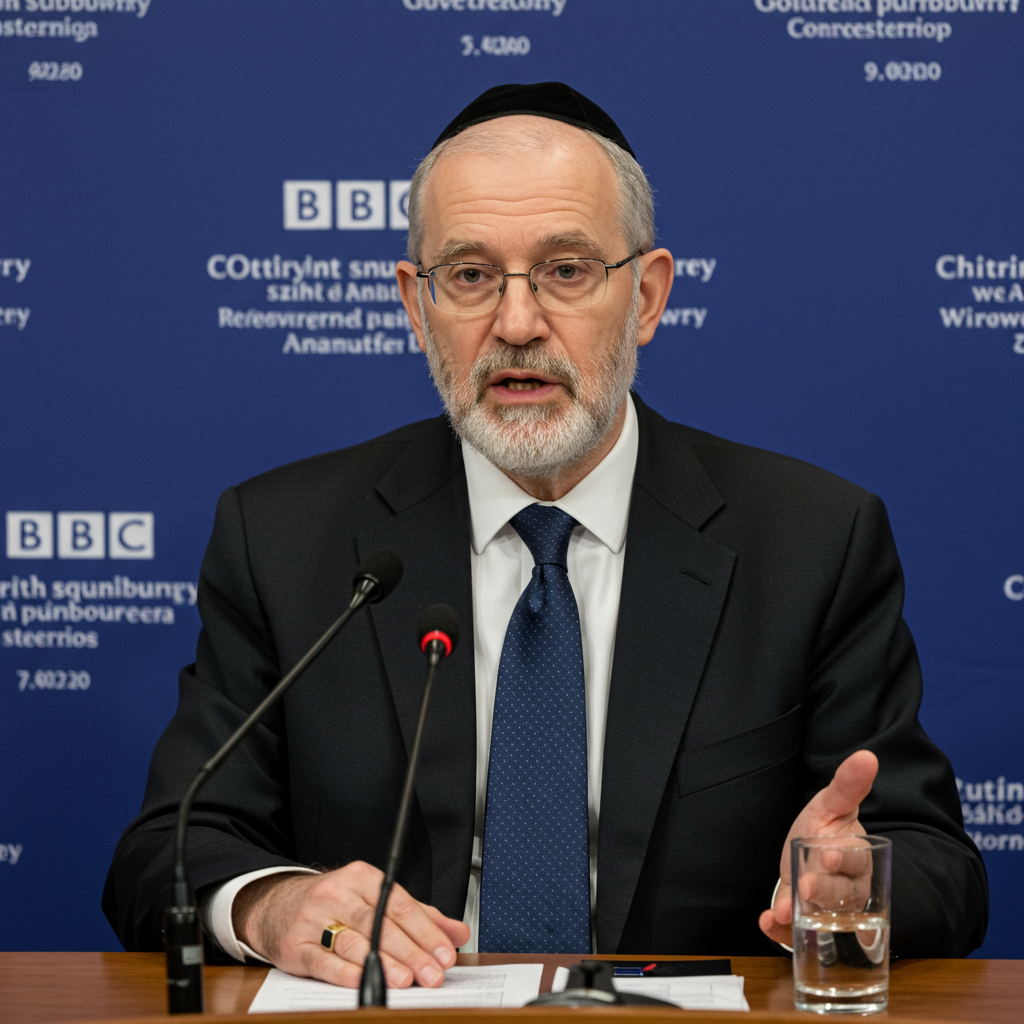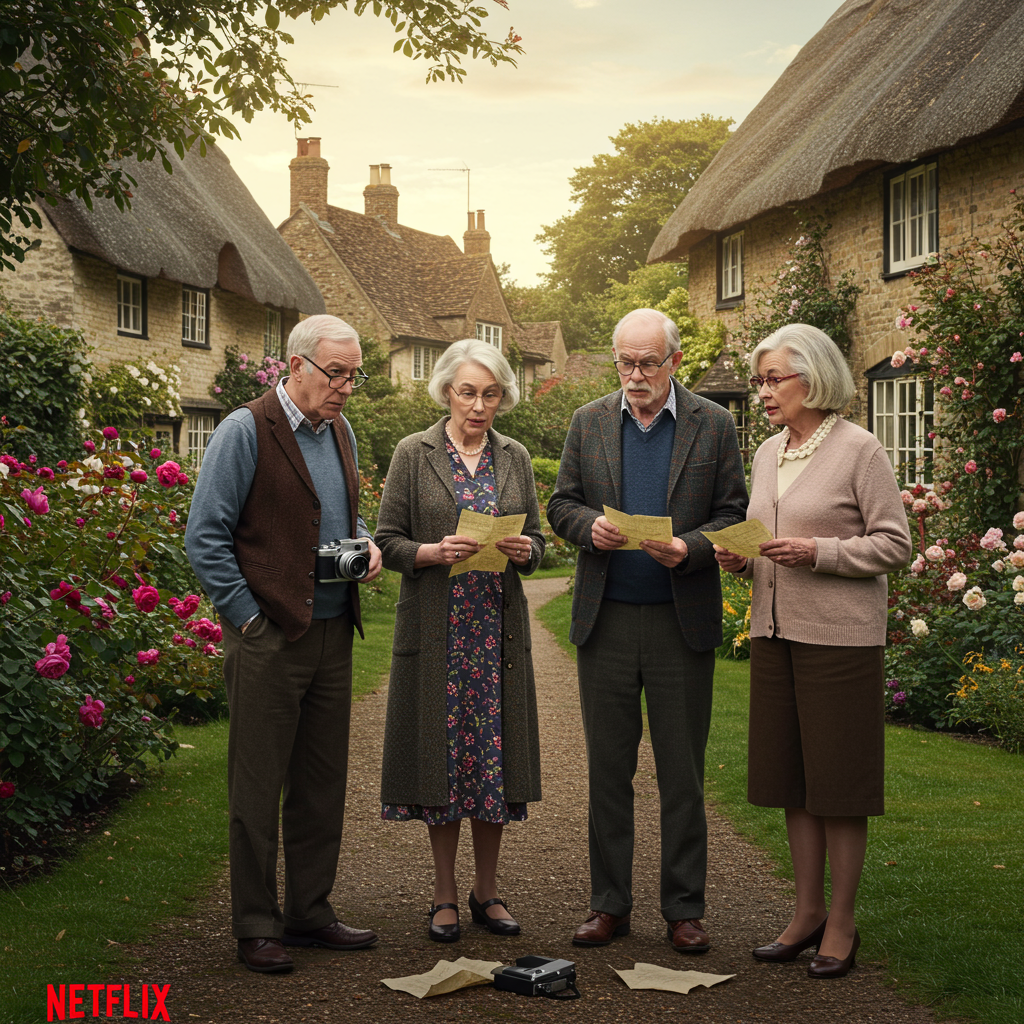A significant controversy has erupted following the BBC’s live broadcast of a performance by the rap-punk duo Bob Vylan at the glastonbury Festival. The UK’s Chief Rabbi, Sir Ephraim Mirvis, has issued strong condemnation, accusing the BBC of airing “vile Jew-hate” during the set. This incident centers on the band’s singer leading the crowd in chants that have sparked widespread outrage and prompted sharp criticism of the national broadcaster’s editorial judgment and response.
The fallout from the performance has been swift and far-reaching, drawing attention from government officials, media regulators, and law enforcement. The core issue revolves around balancing artistic expression, the potential for inciting hatred, and the responsibilities of a public broadcaster during live events. This event marks a new low point in confidence for many regarding the BBC’s handling of sensitive content related to antisemitism.
Chief Rabbi Condemns Broadcast as “Time of National Shame”
Sir Ephraim Mirvis did not mince words in his reaction to the Bob Vylan performance. He took to social media platform X to express his profound disappointment and anger. The Chief Rabbi labelled the airing of the controversial chants as “vile Jew-hate” and described the entire situation as a “time of national shame.”
His criticism extended directly to the BBC’s handling of the event. Sir Ephraim characterized the broadcaster’s response as both “belated and mishandled.” He stated this significantly damages trust in the BBC’s commitment and ability to address antisemitism seriously. The incident, he argued, demonstrates a concerning trend where incitement to violence and hatred is disguised as “edgy political commentary.”
Mirvis expressed alarm that this type of content is not only failing to be recognized for what it is but is being cheered, chanted, and celebrated by ordinary people. He delivered a stark warning, stating that “toxic Jew-hatred is a threat to our entire society.” This perspective underscores the severity with which the incident is viewed within the Jewish community and beyond.
Government and Regulatory Bodies Weigh In on BBC’s Response
The controversy quickly drew the attention of high-ranking government officials. Culture Secretary Lisa Nandy addressed the issue in Parliament, expressing deep concern over the situation. She described the broadcast as an “editorial failure” on the part of the BBC.
Nandy suggested that when a broadcaster experiences multiple such failures, it points towards a potential “problem of leadership.” While reaffirming the government’s support for the BBC as a crucial national institution, she voiced disappointment and “exasperation” with the lack of satisfactory explanations from the BBC’s leadership. This criticism wasn’t limited to the Glastonbury incident but also referenced a previous Gaza documentary and other recent issues.
The Culture Secretary emphasized that the BBC is rightly held to the absolute highest standards due to its vital role. She confirmed she immediately contacted the BBC Director-General after the broadcast. Her questions focused directly on why the live feed wasn’t instantly cut, why the performance was broadcast live at all given prior concerns about other acts, and what due diligence was conducted before deciding to feature Bob Vylan on television. Nandy asserted that the government reserves the right to intervene when the safety and rights of communities are at risk and the national broadcaster fails to uphold its own standards.
Media regulator Ofcom also expressed significant concern regarding the live stream. In a statement, Ofcom indicated that the BBC “clearly has questions to answer.” The regulator confirmed it was in urgent communication with the BBC to gather more information. This includes understanding the procedures in place to ensure compliance with the BBC’s own editorial guidelines. Ofcom’s remit includes regulating editorial standards and preventing the broadcast of material likely to incite crime or disorder, highlighting the seriousness of the potential breaches.
Further scrutiny came from Parliament’s House of Commons culture, media and sport select committee. The committee’s chair formally wrote to BBC Director-General Tim Davie. The letter requested detailed information about the BBC’s operational procedures at Glastonbury. This includes specifics on broadcast delays, staffing levels, and contingency plans in place for handling unexpected issues during live performances.
Bob Vylan’s Response and Consequences
Bob Vylan responded to the widespread criticism via their Instagram account. The band asserted they were being “targeted for speaking up.” They sought to clarify the intent behind the controversial chant.
The duo stated they are “not for the death of Jews, Arabs or any other race or group of people.” Instead, they claimed their focus is on advocating for “the dismantling of a violent military machine.” They suggested that the controversy surrounding their performance serves as a “distraction from the story,” implying it diverts attention from other issues they feel are more critical, such as government inaction regarding the conflict in Gaza. They framed themselves as targets for using their platform to voice strong political opinions.
Despite their explanation, the incident has had immediate and significant consequences for the band. Both members reportedly had their US visas revoked following the performance. US Deputy Secretary of State Christopher Landau confirmed the action, stating that individuals who “glorify violence and hatred” are not welcome visitors to the United States. The band has also reportedly been dropped by their US representatives, United Talent Agency, and potentially their UK agent and management.
Police Investigation Launched into Glastonbury Performances
The controversy escalated further with law enforcement involvement. Avon and Somerset Police confirmed the launch of a criminal investigation into performances by both Bob Vylan and the Irish rap trio Kneecap at Glastonbury on the same day. The police are reviewing footage from both sets.
The aim of the investigation is to determine whether any comments made during either performance constitute a criminal offence. At this early stage, the incident has been recorded as a “public order incident.” A senior detective has been appointed to lead the inquiry. The police noted that they have received contact from people globally and are aware of the “strength of public feeling” surrounding the events. The investigation will be “evidence-led,” considering relevant legislation, including potential hate crime laws.
During Bob Vylan’s set, in addition to the main chant, the singer Pascal Robinson-Foster (who performs as Bobby Vylan) also made critical remarks about a former record label boss. He alleged the boss strongly supported Israel and had signed a letter opposing another band’s performance at Glastonbury. The singer used derogatory language, referring to the former boss as a “[expletive] Zionist.” Andrew Gilbert, vice-president of the Board of Deputies of British Jews, expressed being “absolutely horrified and … perplexed” by these on-stage comments and their subsequent broadcast by the BBC. He questioned why the BBC hadn’t stopped the stream or performed more thorough vetting beforehand. Reports also indicate a screen displayed a message during Bob Vylan’s set claiming Israel’s actions in Gaza constituted “genocide.”
Broader Context and Future Implications
The incident at Glastonbury highlights the inherent challenges faced by broadcasters covering live events, particularly large music festivals. While respecting freedom of expression is a core principle, balancing this with the need to prevent the incitement of hatred or violence is a difficult and complex task in a live environment where unexpected content can occur instantly. The BBC’s internal guidelines mandate editors assess risks in live output, ranging from minor issues to high-profile events. The corporation stated it would review its guidance for future live events to ensure teams are clearer on when output should be pulled.
An alternative perspective was offered by Green Party MP Ellie Chowns. While attending Glastonbury herself and disagreeing completely with Bob Vylan’s chant (“incitement to violence is totally the opposite of my politics”), she suggested the extensive media coverage of the incident was a “distraction.” Chowns argued the focus should remain on the ongoing “actual violence” in Gaza rather than the controversy surrounding the performance.
Looking ahead, Bob Vylan is scheduled to perform at the Radar festival in Manchester. Greater Manchester Police have stated they are aware of this upcoming event. While welcoming artists, they have also made it clear they will “act immediately on any reports of commentary or actions that could be breaking the law” during the performance. This indicates continued scrutiny from authorities on the band’s public appearances following the Glastonbury incident.
The controversy underscores the sensitive nature of political expression regarding the Israeli-Palestinian conflict, particularly in public forums and on national broadcasts. It raises important questions about the lines between protest, offensive speech, and potential incitement, and the responsibilities of platforms that amplify such content. The multiple investigations and official condemnations suggest that the repercussions of this Glastonbury performance are likely to continue unfolding.
Frequently Asked Questions
What specifically did Bob Vylan chant at Glastonbury, and why did it cause controversy?
During their performance at the Glastonbury Festival, the lead singer of Bob Vylan led the crowd in chanting “death, death to the IDF.” The IDF refers to the Israel Defense Forces. This chant immediately sparked controversy because it was widely interpreted as a call for violence or death against members of the Israeli military, which critics, including the Chief Rabbi, condemned as “vile Jew-hate” and potential incitement, particularly when broadcast live by the BBC.
How have UK authorities and regulators responded to the Glastonbury incident involving Bob Vylan and the BBC?
Various bodies have responded critically. The Culture Secretary, Lisa Nandy, expressed concern in Parliament, calling it an “editorial failure” and raising questions about the BBC’s leadership and due diligence. Media regulator Ofcom stated they were “very concerned” and that the BBC “clearly has questions to answer,” launching inquiries into broadcast procedures. Avon and Somerset Police have initiated a criminal investigation into the performances by both Bob Vylan and Kneecap to assess if comments made constituted a criminal offence, recording it as a “public order incident.”
What were the immediate consequences for Bob Vylan following the controversial Glastonbury performance?
Following the performance and the ensuing controversy, Bob Vylan faced immediate repercussions. Both members reportedly had their US visas revoked, with US officials citing their “hateful tirade” as the reason. The band has also been reportedly dropped by their US talent agency and possibly their UK management. Additionally, they are now subject to a criminal investigation by Avon and Somerset Police regarding their set at the festival.


